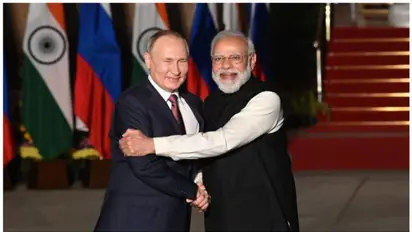India, Russia forge digital economy partnership, accelerating BRICS currency ambitions

Synopsis
The collaboration between Russia and India is not limited to the development of a digital economy; it also aligns with longstanding rumors surrounding the creation of a native BRICS currency.
In a significant move, Russia and India have joined forces to bolster the development of a robust digital economy as part of the ongoing expansion efforts within the BRICS alliance. This collaboration, unveiled at the Smart Cities India Expo program, reflects the shared commitment of both nations to building modern infrastructure and cultivating a secure and comfortable urban environment. As the global geopolitical landscape evolves, the strategic partnership between Russia and India holds the potential to not only shape the digital future of the two countries but also play a pivotal role in the broader ambitions of the BRICS alliance.
Sergey Cheremin, the Minister of the Moscow City government and Chairman of the Board of the Business Council for Cooperation with India, highlighted the shared goal of creating the most modern infrastructure during his address at the Smart Cities India Expo program. This vision encompasses the convergence of efforts in various sectors, with a particular emphasis on information technology and the digital economy. The intent is clear – Russia and India aspire to emerge as leaders in these fields, leveraging their combined strengths to foster innovation, economic growth, and international influence.
The collaboration between Russia and India is not limited to the development of a digital economy; it also aligns with longstanding rumors surrounding the creation of a native BRICS currency. Speculations suggest that this currency could be blockchain-based, representing a groundbreaking step toward the alliance's financial autonomy. While details remain scarce, the commitment of both nations to this ambitious endeavor indicates a shared determination to reduce dependence on existing global financial systems.
The groundwork for the digital economy partnership has already been laid with the establishment of the BRICS Pay system, introduced late last year. This system, designed to challenge the Western-dominated SWIFT payment system, signifies the alliance's intent to institute BRICS-based alternatives and reduce reliance on traditional financial mechanisms. The continued embrace of digital economies by Russia and India is poised to accelerate the progress of BRICS' long-standing de-dollarization efforts, providing the member countries with increased economic autonomy.
As the BRICS alliance undergoes a period of unprecedented growth and transformation, the collaboration between Russia and India in the digital economy realm carries far-reaching implications. The strategic partnership not only strengthens bilateral ties but also contributes to the collective goal of establishing the alliance as a formidable force in the global economic landscape. The pursuit of a native currency, coupled with advancements in digital infrastructure, positions BRICS as a potential pioneer in shaping the future of international finance.
The alliance between Russia and India marks a crucial milestone in the ongoing evolution of the BRICS alliance. The joint commitment to developing a digital economy, coupled with the rumored creation of a blockchain-based currency, underscores the alliance's determination to forge a path independent of existing global financial systems. As the geopolitical sector continues to be shaped by these developments, the collaborative efforts between Russia and India within the BRICS framework hold the promise of reshaping the international economic order in the years to come.
Check the Breaking News Today and Latest News from across India and around the world. Stay updated with the latest World News and global developments from politics to economy and current affairs. Get in-depth coverage of China News, Europe News, Pakistan News, and South Asia News, along with top headlines from the UK and US. Follow expert analysis, international trends, and breaking updates from around the globe. Download the Asianet News Official App from the Android Play Store and iPhone App Store for accurate and timely news updates anytime, anywhere.